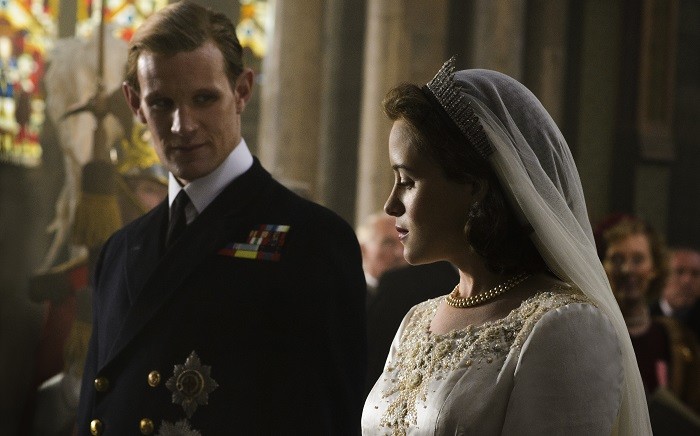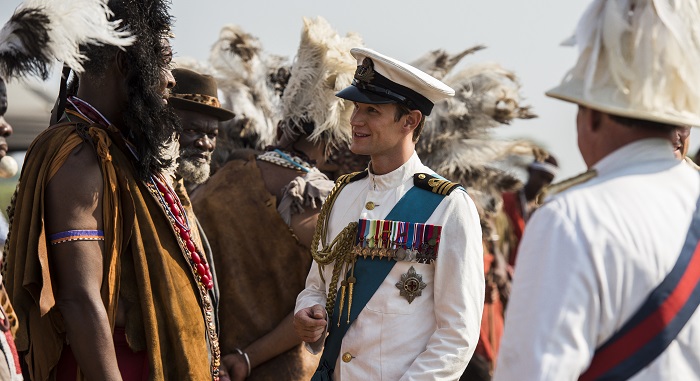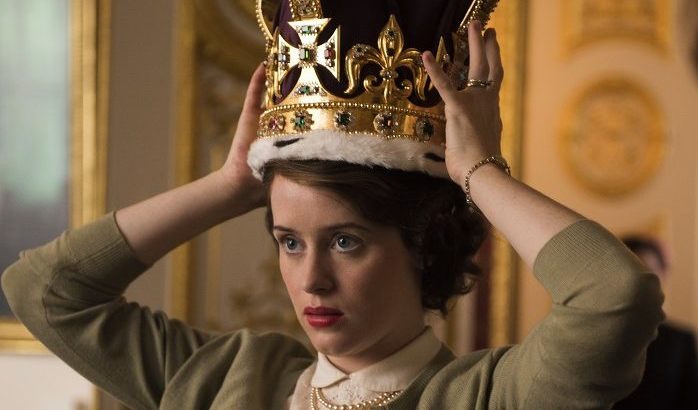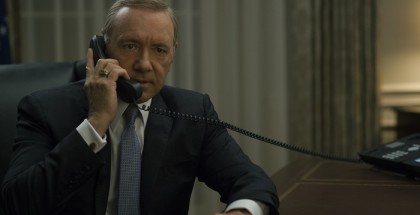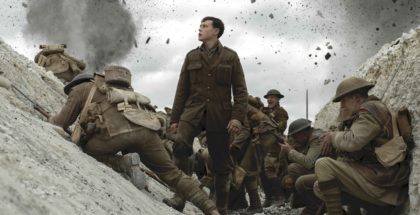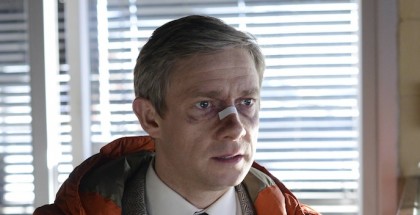“This is not Spitting Image”: Claire Foy and Matt Smith talk The Crown, Netflix and dressing up as royalty
Matthew Turner | On 04, Nov 2016
Today sees the premiere of Netflix’s epic new original drama, The Crown (read our review here). Starring Claire Foy as a young Elizabeth Windsor, Matt Smith as Philip Mountbatten, and John Lithgow as Winston Churchill, it tells the inside story of two of the most famous addresses in the world – Buckingham Palace and 10 Downing Street – as well as the intrigues, love lives and machinations behind the great events that shaped the second half of the 20th century.
We sat down with Claire Foy and Matt Smith to talk perceptions of the royal family, streaming things on Netflix and dressing up as the queen.
So what kind of research did you do for the parts?
Matt Smith (MS): None! [Laughs.] No, lots and lots. A tremendous amount.
Claire Foy (CF): Yes. Obviously because of the time that it’s set, video and all those things are difficult to get hold of, apart from some family videos that they showed at the Jubilee, which we looked at and which are amazing – it’s amazing just to see them relax and stuff, but it was mainly researching the political and social history at the time and then all the other stuff to do with them and how they move and how they speak and what people have said about them, all those sorts of things, we have to sort of navigate.
MS: Yes, you sift through all this rather dense information and pick the best bits.
What surprised you the most about Elizabeth and Philip?
MS: Well, for Philip, he had a really – what’s the word I’m looking for – quite traumatic, I suppose, in many ways, childhood and early life. He went through quite a lot that I didn’t really know about. I mean, I certainly wasn’t aware of the events that happened to him in his early childhood before he went to Gordonstoun and then he went to live with Mountbatten, his sister died in a plane crash and still, he went on to fly planes. So learning all about his early character gave me a real idea about his presence as a man and helped to inform all of that, which was very good.
CF: Yeah. And similarly, I didn’t know a lot about how Elizabeth had come to the throne – I’d never really considered the fact that the family was so shaken by it, I suppose. Because you sort of forget that in order for one person to become the Queen or King, someone else has to die, and that they have a relationship with the person who is following them. And so that was something I’d never really considered, which seems a bit silly, but I just don’t think you do, I just think you just sort of accept that that’s the way it works and that they should be prepared, and they should be able to deal with that sort of grief, but I don’t think anyone can, so it was seeing them as people, really, was the biggest revelation.
Which scenes most jumped out at you when you read the scripts? Which scenes were you most looking forward to doing?
CF: Ooh, what did we do in the audition? What did we do in the screen test? Oh, we argued, didn’t we? Yeah, we argued.
MS: I probably looked forward to the stuff that was abroad, because you get a little trip, and then, of course, whenever you’re abroad, by the last week you’re like, ‘Oh, I’m kind of looking forward to going home now’, but as the series went on, I used to love all my stuff with Claire really, which I think most of the actors who came into contact with her did.
CF: Oh, come off it! Where did that come from?
MS: Jared [Harris], he would always bang on about how good you are, John [Lithgow]… And I got one scene with Noo [Vanessa Kirby], which was thrilling, as well.
CF: It was amazing, that scene.
Was it a challenge portraying real-life people without caricaturing them?
MS: Yes, I think that’s one of the fine balancing acts of the series. This is absolutely not Spitting Image: we’re not doing impersonations of these people, yet we want to retain a sense of them and a sense of their history and who they actually are, factually, and their gait and how they sound and all that sort of stuff, and yet also, we do have to use our imaginations for the dramatic parts of the story that make it engaging, but yeah, that’s the fine line, I think.
CF: Also, I think Nina Gold, who cast it, you notice that when someone casts something really well, they do make a company of actors and I think that’s got a lot to do with Stephen Daldry, who obviously has a theatre background and Peter and all the other directors that we worked with, is that they really did choose people whose natural tendency is to be on the more conservative, skeptical side. I think that’s true, that [as actors], we all tend to go, ‘Well, that’s the conventional route, but what’s going on round here?’ [gestures looking around the side of something] and I think that’s why she’s so good at making a company of actors – she did it with Game of Thrones, she’s able to pick people who might skew the perception of what that part should be, ever so slightly. It’s sort of very difficult to put your hands on, but I think that’s what she’s done, she’s a very clever lady.
MS: Very, very clever, Nina Gold.
Did working on the show change your perspective of the monarchy at all?
CF: I think it changed my perspective of what their role is, or what their job is, and how hard they work. And that it is an institution, and it is a job, and it’s a firm, and things are done a particular way, and when you realise how much they work with the press and how much involvement there is in public perception and gauging public opinion, and how much they read the papers and that is their existence and their life. I think that was something that I hadn’t really registered, that it does work like an organisation.
There were four directors on the show in total – were there any notable differences in how they approached each episode?
MS: Yes, I think it’s like every actor, or every musician, or every artistic personality – everyone has their own way of expressing a dramatic idea, but I think there was a unity within the tone of the show and the tone of them all, and I think there was a sense of collective research and collaboration in trying to sort of harness a journey throughout the actors’ performances and stuff, and I think all of the directors have done really brilliant work.
CF: And there was sort of a director department, it felt like, they were working together as a team, and I think that’s odd with the directors, because directors are a unit on their own, in a way, but they really were all talking to each other all the time, and they were all investing it in different ways. And I’ve done things before where different directors come along and you feel like all of a sudden, someone’s trying to put their stamp on it and it’s a different show, and I’m using this for my moment or whatever, but with this, it didn’t feel like that at all, and in a weird way, it energised you when you knew a new block was coming on and you were getting a director who had been there before or whatever, then it was sort of like, ‘Ooh, how exciting’, because it’s going to give a new surge of energy – which was really useful, I think, because it’s 10 hours of TV.
MS: Yeah, it’s a slog to make, like any big, long show, it’s not easy.
Did you grow up with the royal family? Do you have memories of Diana’s death or anything like that?
MS: I remember that particularly vividly, actually, yeah. But, I mean, don’t we all sort of grow up with a perception and a consciousness of the royal family in some way? I think it’s sort of ingrained in us, isn’t it, as British people, that we’re culturally aware of them and socially aware of them and historically aware of them, so, yeah, I certainly did.
Has working on The Crown made you change any preconception you might have had?
CF: I think my preconceptions about Philip, really – and actually, people have been saying today, especially – he’s a very sympathetic character and he’s a family man and all those sorts of things, and I think when you read the research about him, that’s the obvious thing about it, is that he was. When you do the research and you hear all the stories, you don’t hear any of the idea that Philip is sort of going around insulting people or making massive faux pas, that doesn’t come up, ever, and actually what comes up is the fact he was incredibly ambitious, he was incredibly talented, gifted, diligent, modern in his outlook, incredibly loving of his wife and so dedicated to his children and their upbringing and what was right for them. And also incredibly disregarding of pomp and people bowing to him and people giving him lots of deference and all those things – he just found it all absolutely ridiculous.
MS: And that’s the part of him that I really love.
CF: Yeah. Which is funny, isn’t it, because actually the preconception is just completely wrong.
MS: It must be so frustrating for him, actually.
CF: Oh, no, he probably thinks it’s all hilarious.
You get the sense that that’s where the faux pas come from, that attitude of wanting to distance himself from the pomp…
CF: Yes. And he wants to put them at their ease, as well, doesn’t he?
MS: I think so. I think he’s really popular amongst the staff, in the palace. I spoke to a couple of his former staff and they said, of every member of the royal house, people always want to work for Philip, because he treats you exactly as you are, you can call him by his first name, and I don’t think you can do that to a lot of people, and he really does put you at ease and I think if people who have met him – I mean, we met David Attenborough, who said he thought he was a brilliant man, and if he’s all right by David Attenborough, then he’s all right by us.
If you’d had the chance before shooting, would you have talked to them?
MS: Yes, I mean if they’d have let us…
CF: If we’d have had the chance, yeah, I mean, that’s like living in a different universe, though, where things like that happen. Although [makes indecisive noises], ooh, I don’t know, I don’t know that I would, actually.
MS: I’d have loved to, but…
CF: I’d like to talk to them now.
MS: They’re too busy.
CF: Yeah. They’ve got a lot on.
There’s a huge budget on the show and some incredible locations. Was there a moment for you where you were suddenly impressed by it all?
MS: There were lots of those moments, weren’t there? Because it can’t help but feel slightly ridiculous, because, you know, you’re dressed up as the Duke of Edinburgh and the Queen of England, or the future Queen of England and you’re getting married, and there’s like hundreds of people around.
CF: Eileen Atkins is your guest. How ridiculous!
MS: You can’t help but sort of go, ‘Wow’.
CF: I can’t remember when the moment was that I really, really went, ‘Woah, hang on a second’. I think there’s a bit in the coronation where everyone puts their coronets on, so when I put my crown on – or when someone puts the crown on me – everybody has to put their crown on as well, and it’s like a collective, ‘Oooh’, and I went, ‘Ohhh…’
Was the crown as heavy as it looked?
CF: It was quite heavy, yeah. Not like terribly, terribly – I didn’t have to move anywhere in it. Actually, that’s a lie – I had to walk down the blooming’ aisle…
When you put it on for the first time, how did it feel?
CF: Heavy. How would you think it felt? I’m interested in why you’d ask that question, what you think it would feel like?
There was a moment in one of the episodes, when you put it on for the first time, and I think that there’s a glimpse of the idea that something is changing in her.
CF: Yes, definitely. As Elizabeth, I think that signals the end of the ritual and the beginning of her role, to her, and she starts to take it seriously – I think she always took it seriously, but she takes it seriously from then on. But for me, as Claire, there was no magical moment. I often get confused when people think I’ve had some sort of epiphany and I should get a crown at home, and walk round with it in my dressing gown. [Laughs]
How was the safari scene to shoot, in the second episode?
CF: Oh, it was amazing!
Was that a real elephant or a CGI elephant?
MS: I couldn’t possibly tell you, or I’d have to kill you. But I tell you what was real, they built the sort of hut on stilts, which was for real, so that was actually tree tops, and they built that to scale for real, which was amazing. But I think going to those locations, I think it adds a real romance to those first episodes and I think it adds a scale that the show absolutely needs and it gives it that sort of lyricism, in many ways.
CF: And it’s very odd, because we did that three months into shooting, going out to Africa, and we’re all of a sudden like completely different people in Safari gear, really brown and romantic and windswept and we’d been shooting all the coronation scene, we’d done [episodes] three and five before that. So we’d done a completely different show, as far as we were concerned, and then suddenly we were like, in lurrrve.
MS: Like Gone With The Wind.
CF: It was Gone With The Wind, but it was sort of magic, wasn’t it? Sitting in the back of the jeep, driving along, getting stuck in rivers…
MS: Warthogs flying about…
Is that quite difficult to keep track of where you are in the relationship, given that you were shooting out of sequence?
CF: It is quite tricky, just because you don’t want to get it wrong. But that’s why we did so much research, and there were so many rehearsals and things, because the directors knew that it was going to be tough for everyone involved, that we were going in at a different point. So it was [difficult], but decisions have to be made and you have to be brave.
Does being a well known actor give one a small insight into what it’s like to be inside that sort of goldfish bowl? With Doctor Who, for example…
CF: I suppose we all have our own version and interpretation of celebrity in many ways, whether it’s Kim Kardashian or it’s the Queen of England or it’s a footballer or whatever. I think the difference about the celebrity of the Queen and that particular family is that they have always got to protect the morality and the sort of spiritual value of the family in a way that perhaps other celebrities, particularly in the modern age, don’t have to. And also, they come from a different age, a different age of celebrity, where people actually turned up to see them – I think now everyone sees them through this [indicates phone], so I don’t know really, but yeah, I mean, I suppose, in a way you can draw on things, but nothing can prepare you for the level of celebrity that they have encountered their whole lives, and through no choice of their own – that’s the important thing, I think.
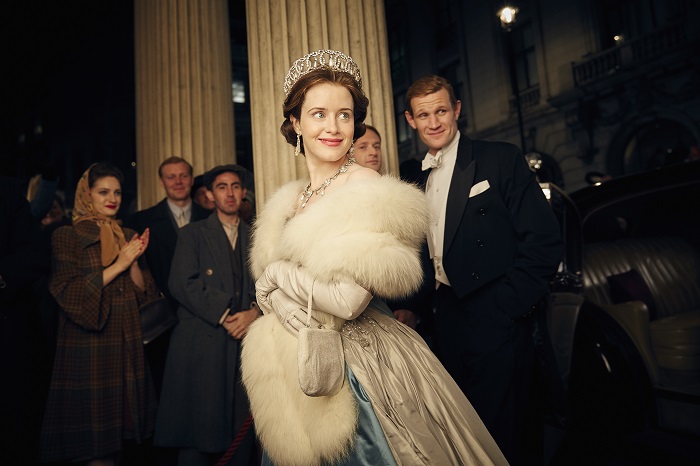
The series is on Netflix. How important do you see Netflix to the future of serialised drama?
CF: Well, it’s leading the way, really, and it’s very interesting just talking to Peter Morgan and Stephen Daldry, is that Peter said, you know, I’ve never felt like this, it’s never felt like I’m making TV, it’s felt like I’m making a film. And he says that’s what he does at Netflix, because of the way that you watch it, you’re not watching it as it’s TV. Because you can watch it in blocks and people want to binge-watch it. They want to watch three episodes, four episodes of it, it’s like watching an extended film. Which is extraordinary for writing and for acting in it, because you get to explore so much more, you don’t have one scene in which to get that emotion exactly right, which is what you sometimes have in film. In a sprawling show like this, you do really have those 10 hours to kind of investigate every little nook and cranny. And I think Netflix has got an amazing – it’s not just the fact that the actual format of it is revolutionary, and I don’t know whether it’s being audience-led or whether they’re leading it, but whatever’s going on is exciting and we also don’t have any idea of what’s going to happen, but from a creative point of view, they aren’t scared about taking risks because they don’t have to get 40 million people just watching it on that one night in order for them to survive; they can have it spread over years and years and years and years and years and the interest in a show can grow and grow and grow over time and so that means that they give the creative people involved the license to do whatever they see fit. Which very rarely happens.
MS: Yeah, it’s not producer-led in quite the same way, which I think is really smart. It’s financially backed, but they back their horses and go, ‘Okay, go away and make it and let’s see what you come up with’, and I think that is brave and intelligent, actually.
Are you big Netflix users yourselves? What have you seen and enjoyed on Netflix recently?
CF: My Netflix subscription has just expired, which is ironic [laughs].
MS: You should probably go and talk to Ted [Sarandos].
CF: Actually, I love a documentary and it’s great for that, so I literally just go onto Documentary and go [mimes clicking several windows] hmm, hmm, hmm, I’ll watch that one, but I do love Stranger Things.
MS: Me too.
CF: And you love Narcos, don’t you?
MS: Narcos.
CF: And I really want to watch Black Mirror.
MS: I started that yesterday. Also, what I love about Netflix is I can watch I’m Alan Partridge on it, and I can return to shows that I also really like, I think that’s kind of smart. You know, you can return to classics, which I think is good.
How do you think the series will play in other countries?
MS: Well, I think there’s a sort of universality to the story, isn’t there? It’s a story ultimately about a young couple in love and the balance of power between state and church and politics and the royals and yeah, I don’t see why not.
CF: I sort of think that actually there’s a funny thing in the sense that, in a weird way, British people are more skeptical about any of those things, that when there’s something they know really well, that you’re sort of instantly like, not protective of it, but sort of skeptical because it’s your history, and so, from the outside, there’s something so pleasing about seeing that, because you’re not coming at it from a point of judgement, you’re just coming at it from a point of view of going, ‘Ooh, what’s this then? I might learn something’, or anything like that. So I hope that the interest is varied.
All episodes of The Crown are available on Netflix UK, as part of an £9.99 monthly subscription.


